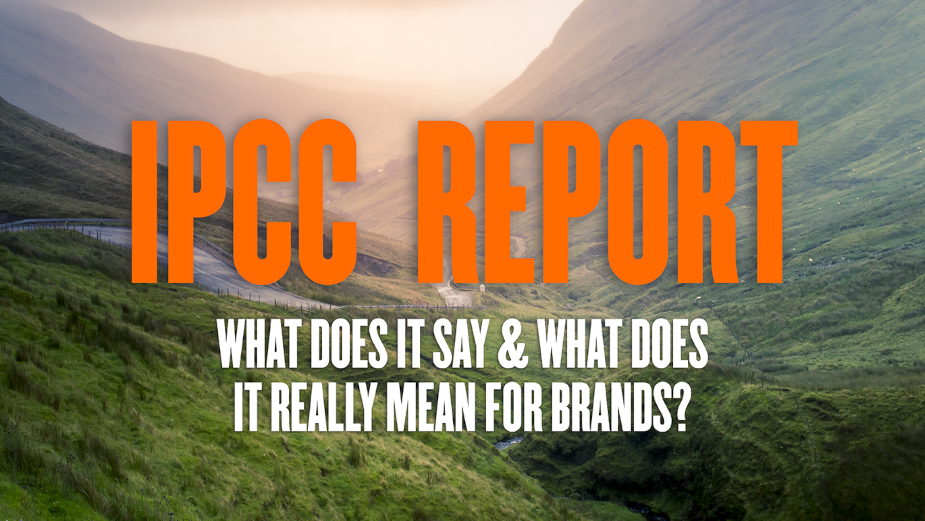
What Does the IPCC Report Mean for Brands and Agencies?

Recent global conversation linking the threads between war and our fossil fuel reliance together has highlighted the importance of climate justice in new ways for many people. With the latest IPCC report (published in early March) providing us with the best understanding yet of what we are doing to our planet and how we can respond, it warrants a spotlight. It reads as an indictment of failed climate leadership and provides a roadmap to climate resilient development: “I have seen many scientific reports in my time, but nothing like this. [The] IPCC report is an atlas of human suffering and a damning indictment of failed climate leadership.” António Guterres, UN Secretary General
What does the IPCC report mean for brands, business & agencies? The THINKHOUSE Planet team hosted a conversation with Sadhbh O’Neill, a lecturer in climate policy and politics at DCU's School of Law and Government to explore.
Report findings you need to know
IPCC reports (even the policy summaries) can be long and complex. But they are always clear about what they are saying. This latest report was brutally frank in terms of our time frames. The world is ‘odds-on’ to miss a brief and rapidly closing window to secure a liveable future. Every tonne of carbon/GHG counts. With this, the threat of irreversibility looms - if we temporarily exceed the warming level of 1.5 degrees, it will result in additional severe impacts, some of which will be irreversible.
Justice and equity are central to this report - the global south & poorest countries have heightened risk while they contribute the least in terms of carbon emissions. Already today there are 3.3 to 3.6 billion people living in areas highly vulnerable to climate change. The work also highlights the need to focus on nature - the findings provide clear insights into nature’s potential not only to reduce climate risks but also to improve people's lives. Safeguarding and strengthening nature via restoration and conservation is key to securing a liveable future. The effectiveness of adaptation decreases with increasing warming, highlighting the need to invest in climate resilience. Investing in adaptation is the right thing to do and the smartest thing to do to save in the long-run.
For brands and agencies alike, now is the time to pay attention and take action. Expert Sadhbh O’Neill puts it like this: “We need to get a very clear understanding of what Net Zero emissions means. What we need to see are very specific targets, covering all three scopes and interim targets. We need to encourage companies to be doing the right thing and making climate contributions - investing in sustainable development projects in other countries. This is ‘results-based finance.’ You’re not making a claim that you’re offsetting, but you’re doing the right thing by supporting climate action and supporting developing countries and communities around the world that need the finance.”
Scope 3 emissions are the most difficult to grapple with but that’s where the action has to happen - that’s also where marketing and advertising plays a powerful role. Not only in helping to drive solution-focused values/mindsets, but also in driving the success of critical brand initiatives that rely on customers to engage with new infrastructures (such as circular economy calls to action/process).
The role of agencies and marketers
When it comes to the importance of collaboration and partnerships, Sadhbh O’Neill speaks about how powerful creative agency partnerships can be for businesses in driving solutions: “The question is, what can we expect from an agency? It can’t be just ‘how to sell more product.’ It has to be a full range of services that help companies change their products and use less energy, so that when people are looking for advice from marketers, that you can connect them up to this bigger conversation. That you can advise them on a range of sustainability questions from the manufacturing right through to the communications, the sales and the corporate claims. It is part of the ESG package to offer these services.”
Regarding the role of creative communicators and marketers more generally, we need to have the difficult conversation around our cultural values and bring creatives and agencies in: “The degrowth conversation forces us to address what we mean by standards of living. The reality is that standards of living have increased dramatically in the west, even with increased inequality. The focus needs to be on solidarity with people who have the least. And that might mean that we have to make sacrifices. But we have to avoid judging and dismissing people… Ordinary people just want to enjoy their lives, so we’re going to have to be gentle [and improve infrastructure and accessibility].”
Key implications for brands and business
The THINKHOUSE Planet team’s analysis of the report highlights the below as key implications for brands and businesses, and communications in general:
- Increase in climate risk assessment, climate budgeting and investment
- Renewed focus on investment in nature (challenge to carbon tunnel vision)
- Stricter legislation & policies on responsible claims (for example offsetting not being enough for a green claim)
- Increased demand for transparency & sustainability audits
- Increased comms across industries on sustainability (crowded space)
- The importance of making ‘aspirational’ messaging responsible and communicating specific positive actions
- Growing customer expectations & skepticism
- Greater emphasis on scope 3 (80% plus of footprints)
Echoing the ‘code red for humanity’ warning from the Working Group 1 report last year, urgency of action is critical and glaringly obvious as we witness more and more destruction and death through extreme weather events. Client and agency collaboration, merged with new forms of intra-industry collaboration, is critical to both driving systematic change and helping consumers to take more positive action.
We are all writing this story right now, together. And this story needs everyone.
By Laura Costello, strategy director, purpose & planet at THINKHOUSE, The Youth Marketing Company.















